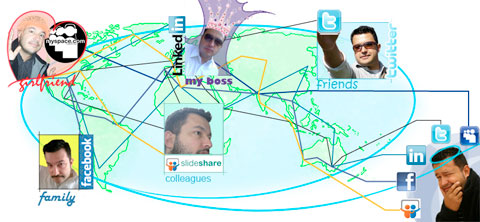Do you know how far away you are from a
fisherman in Papua New Guinea? Not 14259.15 km, but rather six people at most, according to the famous ‘six degrees of separation’ theory, which is really just the magic of networking.
Luchtvaart- en ruimtevaarttechniekstudent Ahmad Bakkar heeft de bèta techniek award WO 2009 gewonnen. De prijs is een van de zogenoemde Echo-awards, een jaarlijkse nationale prijs voor excellente allochtone studenten in het hoger beroepsonderwijs en wetenschappelijk onderwijs. De Libanees Bakkar maakte indruk op de jury ‘door zijn enthousiasme voor techniek en zijn passie voor schrijven’. Hij mag, net als de andere winnaars, deze zomer naar de universiteit van Californië om een zomercursus te volgen.
We’ve known for centuries that we belong to networks – families, schools, companies, sports teams, political parties, religious group. But I wonder when did the tradition of social networking start? And don’t tell me with Facebook, because I’m sure it existed long before the invention of the internet. Actually I’m thinking of the ballroom dancing parties portrayed in Jane Austen’s novels. But if we ask the historians, they’ll probably move the date further backward along the timeline.
One of the old-fashioned networks our generation is familiar with is the ‘old boy’ network, which originally started in the male-only private schools but now usually applies to many prestigious schools. Members of such networks are the alumni of certain schools who help each other in business and professional life. A good example we all probably know is the Delftsch Studenten Corps (DSC) and its formidable network among the Dutch business elite. As time goes by, however, the way the old boys networks do business is being given a high-tech makeover with the overnight emergence of networking sites like LinkedIn.
The omnipresence of various networking sites also provokes our thinking of networking. Networking is a state-of-mind. In his book, ‘Achieving Success through Social Capital’, Wayne Baker says: ‘Success is social. All the ingredients of success that we customarily think of as individual – talent, intelligence, education, effort and luck – are intertwined with networks.’ Smart people know the importance of networking can never be overrated, and they’re building a spider web structure of relationships to catch information 24/7. Networking is also an art. However, mastering this art isn’t that easy.
For most students, professional networking usually starts with academic seminars or conferences. The first encounter with such events can be daunting, but you shouldn’t be scared off, because no matter what you do, you can never do it more wrong than I did at the PCST Conference in Sweden two years ago. My top five faux pas included: my mouth always being too full with Swedish gourmet to talk; I had more interaction with the Wii than with people; I mainly hung out with my schoolmates; I monopolized one professor for a whole day; and my business card was an email address written on a napkin.
But just because I blew my first trial didn’t mean I’d never crack it; nowadays I’m regarded as a good ‘net weaver’, although cultivating my networking skills does demand lots of time and dedication. But, like growing crops, the more effort we put in fertilizing and planting, the greater our reward at harvest time. What we earn from networking is social capital, which, despite being intangible, eventually gives us a good return, provided we know how to spend it.
According to recent statistics, nearly seventy percent of jobs are obtained via networking. When you couple that number with the fact that many other job-search techniques involve some degree of networking, it probably is the most important approach to landing a job.
However these days I hear lots of complaints about networking sites. My friend Sander for instance joined
LinkedIn six months ago, and since then he’s been doing nothing but expecting job offers to appear in his mailbox. With no results at all, he’s now cursing that site to everyone who’ll listen. Well, as someone said, Networks don’t fail, network members fail, which is generally true. Networks are like navigation systems: the routes are indicated, but we’re the ones who must put our feet on the ground and get there.
Still doubting? Here’s one last boost to get you going. Eurostat statistics reveal that since the start of 2009, 18.3 percent of people under 25 have been out of work. So, unless you prefer perpetually staying in school and racking up as many degrees as possible, it’s time for networking.



Comments are closed.